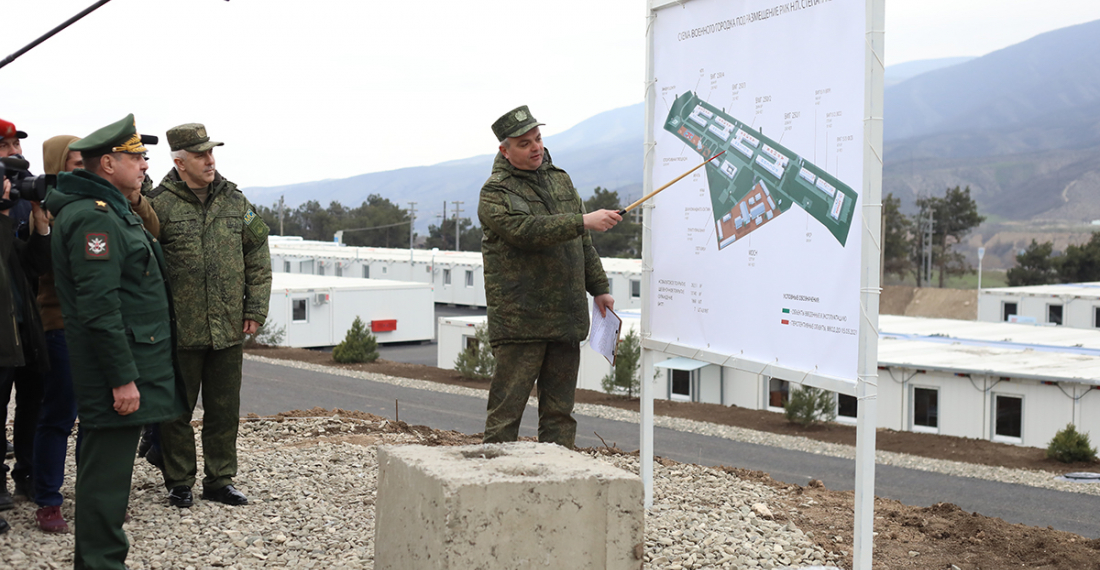As part of the 10 November ceasefire agreement that ended last year's 44-day war, a contingent of Russian soldiers was deployed to Karabakh as peacekeepers. However, the lack of a formally agreed mandate and perceptions of Russian overstepping has led to growing tensions between Baku and Moscow, writes Fuad Shahbazov in this op-ed for KarabakhSpace.eu.
The second Karabakh war ended with the signing of a Russia-brokered ceasefire agreement and the deployment of Russian peacekeeping forces with the aim of preventing further hostilities and ensuring stability in the region. However, the ceasefire arrangements between Azerbaijan–Armenia on one side and Russia–Turkey on the other has left more questions than answers. The fact that there is still no formally agreed mandate for the Russian forces operating on the ground causes outrage in Azerbaijan as local authorities loudly criticise Moscow for provocative actions.
The first signs of the schism occurred when the Azerbaijan National Agency for Mine Action, ANAMA, issued a statement reporting that it had found remains of two exploded Iskander missiles reportedly fired towards Azerbaijani troops from Armenian territory, reigniting the debate as to whether or not such weapons had been used by Armenia during the recent war. The debates regarding Iskander missiles were first put on the table in February 2021 when the Armenian prime minister, Nikol Pashinyan, in an interview with local television, made some intemperate remarks regarding the Russian-made weapons – that the Iskander missiles had failed to explode or only did so 10% of the time. Pashinyan’s statement was a response to former Armenian president Serzh Sargsyan’s earlier accusations of Pashinyan not using the missiles properly during the war. The tough criticism of Russia’s most advanced and sophisticated ballistic missile system, which had been considered a gamechanger in the Nagorno-Karabakh conflict when added to the Armenian arsenal in 2016, immediately caused serious outrage in Russia. In response, the Russian Ministry of Defence denied Armenia's use of the missiles during the war, rebutting Pashinyan’s comments on the ineffectiveness of Iskander missiles and claiming that he had been misinformed.
Nevertheless, having since provided evidence of Iskander missiles fired towards the city of Shusha during the war, Baku has demanded an official explanation on the launch of the lethal ballistic missiles by Armenia. Local Azerbaijani media quickly picked up the story with some government officials expressing their grievances over Russia’s ineffective peace mission and destructive actions undermining the reconciliation process in the region. Azerbaijani frustration with Russia mounted when the peacekeeping force allowed Armenian and Russian officials to separately use the Lachin corridor to visit Nagorno-Karabakh, which Baku considers a blatant provocation. The tension between Moscow and Baku reached its peak, however, when the head of the separatist regime, Arayik Harutunyan, recently travelled to Moscow upon Russia’s invitation.
From the point of view of Azerbaijan, the priority of Russia’s so-called peace mission in Karabakh appears to be to defend and ensure the rights of the ethnic Armenian community while ignoring the rights of the ethnic Azerbaijani community. Moscow has been acting as a protector of ethnic Armenians in Karabakh and encouraged those who fled the region during the war to return. In fact, Russia’s involvement in Karabakh is more than just peacekeeping as the peacekeeping forces actively carry out demining; rebuild schools, highways, hospitals and civilian settlements; and even build new barracks and mobile cities for use by its personnel (pictured). Such developments appear contradictory to Baku, suggesting that Russia eyes an extended peace mission requiring a well-functioning territory with civilians to legitimise its presence on the ground. Meanwhile, Azerbaijan seeks to cut off all political and economic connections between Karabakh and Armenia, trying to reach out to the ethnic Armenian community in Karabakh to persuade them to accept its protection and coexist peacefully. However, Baku has no reliable interlocutors within the Armenian community, which makes this more complicated.
Baku does not hide its disappointment with Moscow’s peace mission in Karabakh as the local Armenian armed groups are still present, which Azerbaijan sees as a violation of the core element of the signed agreement. In addition, Baku is clearly leaning on Moscow to get the long-awaited maps of the landmines laid by the Armenian side during the war, but with no success. These things considered, it should come as no surprise that Azerbaijani authorities are keeping the Iskander-missile issue at the top of the agenda to somehow make Russia act in accordance with the ceasefire agreement, though it is debatable to what extent this tactic has been successful.
It’s clear that Moscow is trying to balance between Baku and Yerevan to keep its footprint in Karabakh for a longer period of time than the anticipated initial five-year period agreed in the 10 November trilateral declaration, without taking any real steps towards reconciliation between the parties. In the light of this development, it is safe to note that Russia’s mediation strategy will likely push Baku further into Turkey’s arms, while any further compromise between Azerbaijani-Armenian ethnic communities and Russia seems impossible in near future.
Source: This op-ed was prepared for KarabakhSpace.eu by Fuad Shahbazov, an independent analyst based in Baku, Azerbaijan. @fuadshahbazov
Photo: Opening ceremony of accommodation for the Russian peace-keeping contingent in Stepanakert (Khankendi); Russian Ministry of Defence



